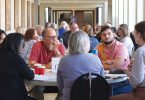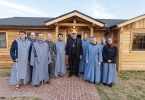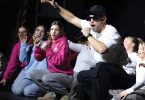Starting from practically nothing, Melissa Cain builds a top notch music program at Holy Cross school
by Steve Johnson OVERLAND PARK — The halls of Holy Cross School here reverberated with applause the afternoon of April 29 in appreciation of the performance of three bands, a bell choir, a chorale group, and numerous individual and small group pieces.
No, the Philharmonic was not in town. Every performance was the work of one or more Holy Cross students — and one very special teacher.
In a time of budget cuts and staff reductions in fine arts programs across the country, Holy Cross enjoys a flourishing and robust grade school music program. Thanks to Melissa Cain.
“Melissa Cain came to us four years ago,” said Mary Jo Gates, principal of Holy Cross. “It was her first teaching job out of college and she just ran with it. She’s energetic. She’s enthusiastic. She doesn’t ask anything of the students that she doesn’t expect from herself.
“Her level of expectation from the kids is high,” continued Gates, “because that is her level of expectation from herself. She wants quality. That’s what she gives them, and that’s what they give back.”
Cain came to Holy Cross as one of three music teachers. In addition to teaching regular music classes for students from kindergarten through eighth grade, she was also charged with instructing the band. At the time, the band consisted of some 15 students, only five of which were returning.
“I just went into it with a lot of energy and I never thought it would get as big as it has,” Cain said. “I love music, and band was my thing, so that’s where a lot of my energy is. I had studied instrumental music in college. That’s my expertise. Plus the school wanted it and the community wanted it.”
Teaching the kindergartners gave Cain the chance to instill in her students a love of music at an early age, along with some basic technique. Through those early general music classes, she taught her students how much fun music can be and prepared them to join the band by the time they reach the fifth grade.
“For me, it’s all about music appreciation. I thought it was important to make music a fun class where they could also learn,” she said. “There are tons of studies that show how [the study of music] correlates with math and science and history. It adds to self-esteem and it gives students another outlet.”
“At the same time, I can sort of hone my students a little bit to go into band,” she said with a grin. “So in fourth grade, we always start recorder. And we start them playing and recognizing the notes, so when it comes time to join band, they will already have a head start. They’ll already know half of it.”
“That first year, it was really hard,” Cain recalled. “I literally had five kids raise their hands who were returning to band. Plus, I had band after school as an extracurricular activity. I went to every class and really had to build it up. I started with 18 that first year, then it went to 40, then to 60, and to 80, and it just keeps growing.”
Cain attributes the success of the program in large part to the support of the administration.
“I really haven’t been able to give her a lot of budgetary support,” Gates said. “What I have really given to her is time, by incorporating the band class into the school day as opposed to after school.”
Cain is now the only music teacher at Holy Cross and without the move to offer band during class hours, she knows she could not have accomplished all she has.
And she has accomplished a lot. There is a fifth-grade band, a sixth- grade band, a junior high band, a hand-bell choir, a vocal ensemble, and more. She teaches individual instrument lessons before and after school, usually at no charge.
“They have to practice and they have to give up study hall for band class,” Cain said. “So there is a sacrifice on their part.”
But what about the sacrifice on her part?
“Well, it’s huge,” Cain said with a big smile. “This year has probably been my hardest year, with all the lessons and more kids.
“But I just have to plan. I planned all the music for this entire year before the school year even started. I couldn’t do it if I wasn’t organized — and flexibility helps, too.”
For Cain, it’s all about helping the students develop the talents God has given them.
“They are blessed,” she said. “They have been given a gift from God and this gives them a way to share that gift. They can even be an active participant in Mass by performing or just by singing.”
Other schools in the archdiocese have music programs, but few rise to the level reached by Holy Cross in the last few years. Cain said they have attended music festivals where there are 160 kids, and half of them are from Holy Cross. The junior high group even took on the fairly daunting task at a recent concert: performing Glenn Miller’s “In the Mood” as a tribute to one of the teachers who was retiring that year.
The surprise brought that teacher to tears and demonstrated the pride and sense of accomplishment the entire school takes in Cain’s work.
Another instance illustrates the loyalty of the band members to Cain.
Anna Kropf, an eighth-grader who plays flute in the junior high band, has been with Cain for four years and was excited to play in the spring concert. As luck would have it, the concert was on the same night as Star Night, an event for the incoming freshman at the high school she planned to attend.
“I said, ‘Anna, what are you going to do? Are you going to go to Star Night or the concert?’” said Jenny Kropf, Anna’s mother. “And she said, ‘Well, Mom, I’m not going to miss the spring concert. I’ve been with Mrs. Cain for this many years and I cannot disappoint her. She’s meant so much to this program and she means so much to me.”
When Cain heard Anna chose to miss most of Star Night in order to be at the concert for her, she was clearly moved.
But she said it was more than personal.
“If they stick through it like Anna has, there is a real sense of pride in participating,” said Cain. “And band teaches teamwork, too. She knows if she’s not there, the whole band will suffer.”
“[The music program] has given a connection between the older kids and the younger kids that is hard to create,” said Gates. “It has been a huge addition to our sense of community — our sense of identity.
“It’s become part of who we are.”






